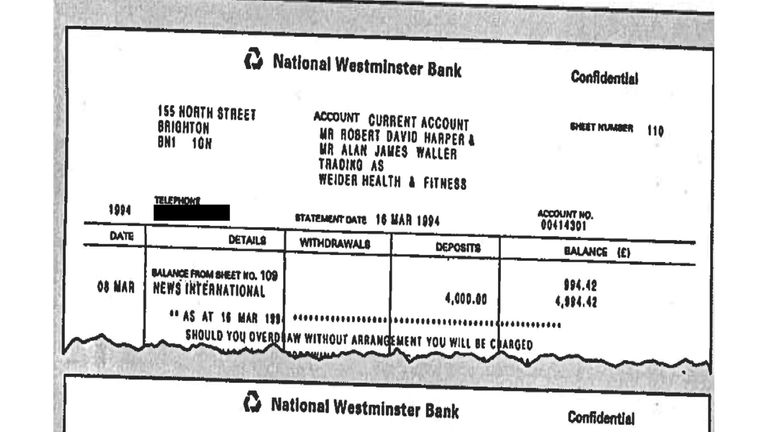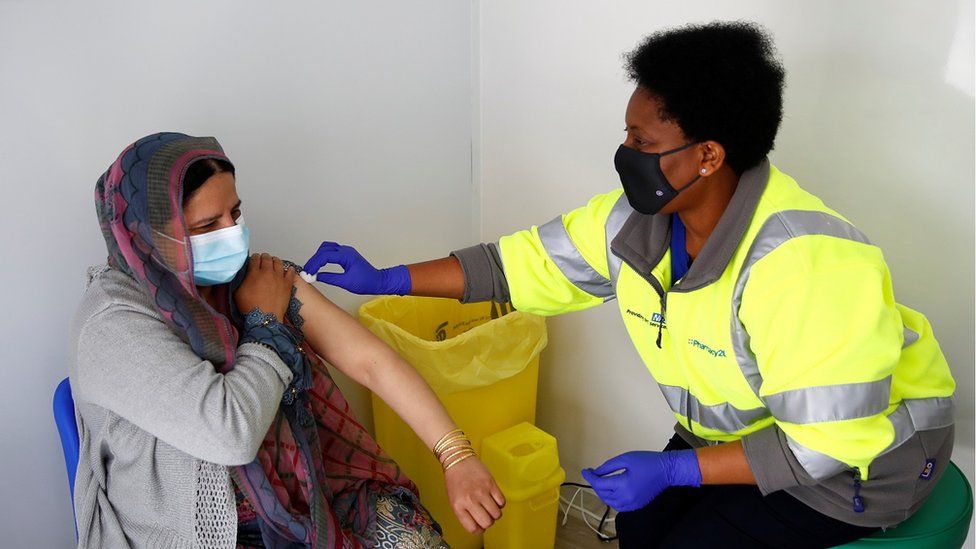
More than 60 million coronavirus vaccine doses have now been administered in the UK, Matt Hancock says.
It comes after 762,361 first and second jabs were delivered in total across the country on Saturday - the second highest number since the rollout began late last year. Only 20 March had more vaccines administered - 844,285.
Some 205,410 people in the UK had their first dose of a COVID vaccine on Saturday, taking the total to 37,943,681.
Also, 556,951 people received their second shot on Saturday, meaning 22,643,417 are now fully vaccinated against the coronavirus.
Health Secretary Mr Hancock described it as a "huge day" for vaccinations.
"This is a fantastic milestone in our fight against this virus," Mr Hancock said on Sunday.
"Thank you to everyone involved in our national effort. When you get the call, get the jab."
In a statement, he also said: "Our trailblazing vaccination programme - the biggest and most successful in NHS history - is another great British success story and a testament to what can be achieved when all four corners of country comes together to defeat this virus.
"Our country has one of the highest uptake rates in the world and I'm delighted that so many have answered our call to arms. If you have not yet come forward, and you are eligible, I urge you to take up the offer - it could save your life and protect your loved ones."
The government has said to ensure people have the strongest possible protection against COVID-19, appointments for second doses have been brought forward from 12 to eight weeks for the remaining people in the top nine priority groups who have yet to receive both doses.
The UK has recorded five more coronavirus-related deaths and 2,235 new cases in the latest 24-hour period, according to government data.
The figures compare with six deaths and 2,694 cases announced on Saturday, while four deaths and 1,926 cases were announced last Sunday.
Mr Hancock says he is "increasingly confident" England is on track for the government's coronavirus roadmap.
His words come after a study by Public Health England (PHE) showed promising results for the two main vaccines from Pfizer/BioNTech and AstraZeneca being used to fight the pandemic in the UK.
Mr Hancock said: "I'm increasingly confident we're on track for the roadmap because this data shows the vaccine after two doses works just as effectively, and we all know that the vaccine is our way out of this."
Under the government's plans, a further easing of social distancing restrictions is due to take place on 21 June at the earliest.
From that date, nightclubs are due to reopen and restrictions on large events such as festivals are to be lifted, as are restrictions on the number of people at weddings.
The PHE study found two weeks after the second dose, the Pfizer vaccine was 88% effective against symptomatic disease from the Indian variant, while the AstraZeneca vaccine was 60% effective.
However, they were only 33% effective three weeks after the first dose, compared with about 50% against the Kent strain.
"What it means for every single person watching is it is even more important than it was before to get the second jab," he said.
Two jabs of the Pfizer vaccine were 93% effective against the Kent variant, while two AstraZeneca jabs had 66% efficacy.
Also, people looking to head from the UK to France could face stronger restrictions due to the prominence of the Indian variant.
Foreign Minister Jean-Yves Le Drian said Britain could be put in a health category of its own, somewhere between EU nations and red list countries like India.
It comes after Germany designated the UK a "virus variant region" on Friday.
Mr Le Drian said, without specifics, that "health measures that are a bit stronger" could be applied for British tourists.
https://news.google.com/__i/rss/rd/articles/CBMifGh0dHBzOi8vbmV3cy5za3kuY29tL3N0b3J5L2NvdmlkLTE5LW1vcmUtdGhhbi02MC1taWxsaW9uLXBlb3BsZS1pbi11ay1oYXZlLWhhZC1ib3RoLXZhY2NpbmUtZG9zZXMtbWF0dC1oYW5jb2NrLXNheXMtMTIzMTQ4MjbSAYIBaHR0cHM6Ly9uZXdzLnNreS5jb20vc3RvcnkvYW1wL2NvdmlkLTE5LW1vcmUtdGhhbi02MC1taWxsaW9uLXZhY2NpbmUtZG9zZXMtaGF2ZS1iZWVuLWFkbWluaXN0ZXJlZC1pbi11ay1tYXR0LWhhbmNvY2stc2F5cy0xMjMxNDgyNg?oc=5
2021-05-23 15:03:01Z
CBMifGh0dHBzOi8vbmV3cy5za3kuY29tL3N0b3J5L2NvdmlkLTE5LW1vcmUtdGhhbi02MC1taWxsaW9uLXBlb3BsZS1pbi11ay1oYXZlLWhhZC1ib3RoLXZhY2NpbmUtZG9zZXMtbWF0dC1oYW5jb2NrLXNheXMtMTIzMTQ4MjbSAYIBaHR0cHM6Ly9uZXdzLnNreS5jb20vc3RvcnkvYW1wL2NvdmlkLTE5LW1vcmUtdGhhbi02MC1taWxsaW9uLXZhY2NpbmUtZG9zZXMtaGF2ZS1iZWVuLWFkbWluaXN0ZXJlZC1pbi11ay1tYXR0LWhhbmNvY2stc2F5cy0xMjMxNDgyNg








